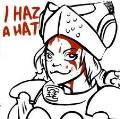| Author |
Message |
 |
|
|
 |
|
Advert
|
Forum adverts like this one are shown to any user who is not logged in. Join us by filling out a tiny 3 field form and you will get your own, free, dakka user account which gives a good range of benefits to you:
- No adverts like this in the forums anymore.
- Times and dates in your local timezone.
- Full tracking of what you have read so you can skip to your first unread post, easily see what has changed since you last logged in, and easily see what is new at a glance.
- Email notifications for threads you want to watch closely.
- Being a part of the oldest wargaming community on the net.
If you are already a member then feel free to login now. |
|
 |
![[Post New]](/s/i/i.gif) 2013/03/19 04:01:44
Subject: Re:Officials: 80 Percent Of Recent NYC High School Graduates Cannot Read
|
 |

The Conquerer
Waiting for my shill money from Spiral Arm Studios
|
Elements of Calculus could be worked into Algebra. More focus needs to be put on teaching Algebra and making sure students get it. Possibly introducing certain concepts earlier than they are.
|
Self-proclaimed evil Cat-person. Dues Ex Felines
Cato Sicarius, after force feeding Captain Ventris a copy of the Codex Astartes for having the audacity to play Deathwatch, chokes to death on his own D-baggery after finding Calgar assembling his new Eldar army.
MURICA!!! IN SPESS!!! |
|
|
 |
 |
![[Post New]](/s/i/i.gif) 2013/03/19 04:16:11
Subject: Officials: 80 Percent Of Recent NYC High School Graduates Cannot Read
|
 |

Mysterious Techpriest
|
 KalashnikovMarine wrote: KalashnikovMarine wrote: azazel the cat wrote: azazel the cat wrote:Sir Pseudonymous wrote:Old works tend to receive disproportionate praise simply for being the first halfway competent example of a genre, or theme, or whatever. This gives them no more value than their actual quality outside anything but a history class concerning itself with such trivia as who happened to do some now-common thing first.
I'm not even going to engage with your commentary, as it is a celebration of ignorance on all levels. You have simultaneously revealed that you have no credible understanding of literature, its history or its value as an art form. I'm not sure exactly how your experiences with literature have managed to obviously fail you so spectacularly, but I'm truly sorry for your loss.
Well I suppose he could be making the high minded argument that Shakespeare for example was in all reality low brow entertainment for the masses with an over reliance on a good fart joke (Chaucer is responsible the first fart joke in English to be written down as I recall) then mixing that argument with the actual good point that none of what we call classics today were written as anything but entertainment, or occasionally a public way to insult one's enemies (see The Divine Comedy) with English teachers liking to add layer upon layer of symbolism that most likely isn't there. Forgetting the actual audience and purpose of a work is also endemic to film studies who again like to pull symbolism from the ether to make things seem more important and nuanced then they actually probably are. (Hitchcock and a few other auteurs being exceptions that prove the rule)
That wasn't what I was arguing, but it is one of the things my argument is predicated on. I suppose I take it as a bit of a given. Considering that I all but said literary criticism and analysis is making up a random point and then making a rational argument as to why a book really means the thing you just made up, I think it's safe to say I don't have a high opinion of symbolism and whatnot being an integral part of works.
To put it simply: the books hailed as classics today were just entertainment, and in the case of Shakespeare very low-brow and often nonsensical entertainment, who are given undeserved priority and praise over more modern, better written works simply by virtue of having done a given theme or cliche or genre first, or at least been the first halfway competent example thereof.
|
|
This message was edited 1 time. Last update was at 2013/03/19 04:17:45
|
|
|
 |
 |
![[Post New]](/s/i/i.gif) 2013/03/19 04:32:50
Subject: Officials: 80 Percent Of Recent NYC High School Graduates Cannot Read
|
 |

Depraved Slaanesh Chaos Lord
|
Sir Pseudonymous wrote: azazel the cat wrote: azazel the cat wrote:Sir Pseudonymous wrote:Old works tend to receive disproportionate praise simply for being the first halfway competent example of a genre, or theme, or whatever. This gives them no more value than their actual quality outside anything but a history class concerning itself with such trivia as who happened to do some now-common thing first.
I'm not even going to engage with your commentary, as it is a celebration of ignorance on all levels. You have simultaneously revealed that you have no credible understanding of literature, its history or its value as an art form. I'm not sure exactly how your experiences with literature have managed to obviously fail you so spectacularly, but I'm truly sorry for your loss.
You're arguing that people, informed by the successes and failings of their predecessors, cannot and do not surpass their achievements with great regularity? Do you believe that Edison's Conquest of Mars is better than modern sci-fi by virtue of being the first to use basically every standard theme that is sci-fi?
Looking back at historical literature from a modern context, I see no way one can reasonably put it on a pedestal above later, superior works. It's only intrinsic value comes in the context of specifically studying the history of literature, which is far from a useful pursuit. I don't need to know the history of algorithmic math to program, nor do I need to know the history of western music theory to utilize its teachings. Likewise there is no value to a general education to be derived from historically significant works that are nonetheless surpassed in quality by later, but less historically significant, ones.
I think this is ultimately a question then of determining quality, which is highly subjective. However, literature, like all art, does not necessarily improve through refinement like science. For example, Philip K. Dick was one of the most important "idea men" in science fiction, but honestly his writing is something that would be expected out of a middle-of-the-pack seventh grader.
However, to think that something is superior because it is newer is an indescribable fallacy.
KalashnikovMarine wrote:Well I suppose he could be making the high minded argument that Shakespeare for example was in all reality low brow entertainment for the masses with an over reliance on a good fart joke (Chaucer is responsible the first fart joke in English to be written down as I recall) then mixing that argument with the actual good point that none of what we call classics today were written as anything but entertainment, or occasionally a public way to insult one's enemies (see The Divine Comedy) with English teachers liking to add layer upon layer of symbolism that most likely isn't there. Forgetting the actual audience and purpose of a work is also endemic to film studies who again like to pull symbolism from the ether to make things seem more important and nuanced then they actually probably are. (Hitchcock and a few other auteurs being exceptions that prove the rule)
Shakespeare was marketed for the masses, and it was written to catpure their attention, but it was most definitely not written exclusively for them. Romeo and Juliet opens with a fight and MacBeth opens with witches and magic in order to capture a low-brow audience's attention early on. However, the themes throughout both are definitely written for someone capable of critical analysis. That's what makes a lot of his writing legendary: it works on many levels. English teachers do not add the layers of symbolism, it is already there. Nobody "lucks" into a concentration like that.
streamdragon wrote:I'm a fan of the Bard, mind, but seriously... can we at least give kids some new options that haven't been made into a million bad movies? Can I get some King Lear maybe? Some Twelfth Night? No no, R&J, Hammie, and MacMommyissues. I think we covered each of those books twice each during my time in middle and high school.
This may be where the education system differs for us. In BC, Canada, King Lear and Twelfth Night are both taught in schools (so are R&J, Hamlet and MacMommyissues, which, btw, is my new favourite way to describe that play).
|
|
|
 |
 |
![[Post New]](/s/i/i.gif) 2013/03/19 04:42:49
Subject: Re:Officials: 80 Percent Of Recent NYC High School Graduates Cannot Read
|
 |

Fixture of Dakka
Kamloops, BC
|
Weird, I got Macbeth (which I enjoyed) and Romeo and Juliet (which I found boring) in high school.
|
|
|
 |
 |
![[Post New]](/s/i/i.gif) 2013/03/19 04:43:50
Subject: Officials: 80 Percent Of Recent NYC High School Graduates Cannot Read
|
 |

Hallowed Canoness
|
Well as long as you don't call The Scottish Play by name.
|
I beg of you sarge let me lead the charge when the battle lines are drawn
Lemme at least leave a good hoof beat they'll remember loud and long
SoB, IG, SM, SW, Nec, Cus, Tau, FoW Germans, Team Yankee Marines, Battletech Clan Wolf, Mercs
DR:90-SG+M+B+I+Pw40k12+ID+++A+++/are/WD-R+++T(S)DM+ |
|
|
 |
 |
![[Post New]](/s/i/i.gif) 2013/03/19 04:45:48
Subject: Re:Officials: 80 Percent Of Recent NYC High School Graduates Cannot Read
|
 |

The Conquerer
Waiting for my shill money from Spiral Arm Studios
|
Scottish Play?
|
Self-proclaimed evil Cat-person. Dues Ex Felines
Cato Sicarius, after force feeding Captain Ventris a copy of the Codex Astartes for having the audacity to play Deathwatch, chokes to death on his own D-baggery after finding Calgar assembling his new Eldar army.
MURICA!!! IN SPESS!!! |
|
|
 |
 |
![[Post New]](/s/i/i.gif) 2013/03/19 04:50:19
Subject: Re:Officials: 80 Percent Of Recent NYC High School Graduates Cannot Read
|
 |

Decrepit Dakkanaut
|
http://en.wikipedia.org/wiki/The_Scottish_Play
The Scottish Play and the The Bard's Play are euphemisms for William Shakespeare's Macbeth. The first is a reference to the play's Scottish setting, the second a reference to Shakespeare's popular nickname. According to a theatrical superstition, called the Scottish curse, speaking the name Macbeth outside a theatre will cause disaster. A variation of the superstition forbids direct quotation of the play (except during rehearsals) while inside a theater.
|
|
|
|
 |
 |
![[Post New]](/s/i/i.gif) 2013/03/19 04:50:52
Subject: Re:Officials: 80 Percent Of Recent NYC High School Graduates Cannot Read
|
 |

Fixture of Dakka
Kamloops, BC
|
It's set in Scotland but was made by famous English playwright William Shatner. Automatically Appended Next Post:  streamdragon wrote: streamdragon wrote: Cheesecat wrote: Cheesecat wrote: streamdragon wrote: streamdragon wrote: Cheesecat wrote: Cheesecat wrote:Sir Pseudonymous wrote:
I disagree that "timeless literature" is a thing that exists. Old works tend to receive disproportionate praise simply for being the first halfway competent example of a genre, or theme, or whatever. This gives them no more value than their actual quality outside anything but a history class concerning itself with such trivia as who happened to do some now-common thing first.
The reason some stories are constantly repeated and others fade into obscurity is because the themes are still relevant to modern society that's why a story like Cinderella that is several hundred years old is still widely known by public as the themes of sibling rivalry and finding a partner
who is successful in life are still important to modern society, if Cinderella's motifs weren't still important to us most people wouldn't of heard of it.
I'm going to disagree with a particular point. Cinderella is famous not because of its motifs and lessons, but rather because Disney made a movie out of it years ago. There are plenty of other fairie tales, with a variety of good and useful lessons, but they are almost unknown to the majority of people. How many people could name more than 3 of Aesop's Fables, for instance, if even that many?
Just a small nitpick.
I disagree if people didn't find the themes in the Disney adaptation of Cinderella important to the there lives it wouldn't be a success, why would parents still show the movie to there kids if they didn't think there was anything important to be learned from it?
Because it is a cartoon, and children like cartoons. If it were the story itself, you would find other versions of the story that were equally as successful, and yet the Julie Andrews version is rarely seen and even contemporary releases see nowhere close to the success of the Disney version. Even the story has changed from the original version(s). Prior to 1967 the Cinderella story completely lacked a fairy godmother, pumpkin coach (which makes today's reference of 'turning into a pumpkin at midnight'), or glass slippers! Basically, Disney's version is the most famous because it built on Grimm (the most famous but certainly not original version of the time) and even then, changed the story that the Grimm brothers actually penned into something that was appropriate to children. Spoiler alert: in the Hans Christian Anderson story of the Little Mermaid, Ariel dies. And yet we the most popular version has her living Happily Ever After.
But seriously, 3 Aesop's Fables without looking it up.
While I do agree that TV cartoons are a more stimulating medium than say a book, which is probably why the Disney adaption is the most popular Cinderella story also the Julie Andrews version was released 7 years later and probably audiences thought that 1950 cartoon version did
the job well enough plus the story's simplicity makes it ideal for children so the kid friendly cartoon medium makes more sense. Also the Grimm's fairy tales in general are usually darker than the Disney variants I think a lot of parents pick the Disney variants specifically for this reason.
|
|
This message was edited 3 times. Last update was at 2013/03/19 05:18:40
|
|
|
 |
 |
![[Post New]](/s/i/i.gif) 2013/03/19 15:56:56
Subject: Re:Officials: 80 Percent Of Recent NYC High School Graduates Cannot Read
|
 |

The Conquerer
Waiting for my shill money from Spiral Arm Studios
|
 WarOne wrote:
http://en.wikipedia.org/wiki/The_Scottish_Play WarOne wrote:
http://en.wikipedia.org/wiki/The_Scottish_Play
The Scottish Play and the The Bard's Play are euphemisms for William Shakespeare's Macbeth. The first is a reference to the play's Scottish setting, the second a reference to Shakespeare's popular nickname. According to a theatrical superstition, called the Scottish curse, speaking the name Macbeth outside a theatre will cause disaster. A variation of the superstition forbids direct quotation of the play (except during rehearsals) while inside a theater.
Hmmm, never heard it called by that name.
|
Self-proclaimed evil Cat-person. Dues Ex Felines
Cato Sicarius, after force feeding Captain Ventris a copy of the Codex Astartes for having the audacity to play Deathwatch, chokes to death on his own D-baggery after finding Calgar assembling his new Eldar army.
MURICA!!! IN SPESS!!! |
|
|
 |
 |
![[Post New]](/s/i/i.gif) 2013/03/19 19:46:46
Subject: Officials: 80 Percent Of Recent NYC High School Graduates Cannot Read
|
 |

Dwarf High King with New Book of Grudges
United States
|
 whembly wrote: whembly wrote:
However, I'd STRONGLY advocate at least some sort of logic class in each major phases of education, because it's so integral to our everyday life.
How do you teach that reliably? Formal logic is easy to teach, but it will be about as useful to most people as calculus.
But informal logic, how do you construct a class around that? I mean, if you didn't learn informal logic in the course of growing up, then no educator can help you.
Sir Pseudonymous wrote:Considering that I all but said literary criticism and analysis is making up a random point and then making a rational argument as to why a book really means the thing you just made up, I think it's safe to say I don't have a high opinion of symbolism and whatnot being an integral part of works.
They aren't integral parts of the works involved. Literature is used in order to force you to make an argument, in an attempt to teach you how to do so.
|
|
This message was edited 3 times. Last update was at 2013/03/19 19:51:06
Life does not cease to be funny when people die any more than it ceases to be serious when people laugh. |
|
|
 |
 |
![[Post New]](/s/i/i.gif) 2013/03/19 20:53:47
Subject: Re:Officials: 80 Percent Of Recent NYC High School Graduates Cannot Read
|
 |

The Conquerer
Waiting for my shill money from Spiral Arm Studios
|
The concepts of rationally thinking through a problem can apply to every decision you make. And would at the very least improve their ability to learn other stuff.
|
Self-proclaimed evil Cat-person. Dues Ex Felines
Cato Sicarius, after force feeding Captain Ventris a copy of the Codex Astartes for having the audacity to play Deathwatch, chokes to death on his own D-baggery after finding Calgar assembling his new Eldar army.
MURICA!!! IN SPESS!!! |
|
|
 |
 |
![[Post New]](/s/i/i.gif) 2013/03/20 01:07:06
Subject: Officials: 80 Percent Of Recent NYC High School Graduates Cannot Read
|
 |

Depraved Slaanesh Chaos Lord
|
Sir Pseudonymous wrote:Considering that I all but said literary criticism and analysis is making up a random point and then making a rational argument as to why a book really means the thing you just made up, I think it's safe to say I don't have a high opinion of symbolism and whatnot being an integral part of works.
Then you should read better books. I recommend East of Eden by John Steinbeck and Blood Meridian by Cormac McCarthy.
|
|
|
 |
 |
![[Post New]](/s/i/i.gif) 2013/03/20 02:50:54
Subject: Officials: 80 Percent Of Recent NYC High School Graduates Cannot Read
|
 |

The Dread Evil Lord Varlak
|
 azazel the cat wrote: azazel the cat wrote:Sir Pseudonymous wrote:Considering that I all but said literary criticism and analysis is making up a random point and then making a rational argument as to why a book really means the thing you just made up, I think it's safe to say I don't have a high opinion of symbolism and whatnot being an integral part of works.
Then you should read better books. I recommend East of Eden by John Steinbeck and Blood Meridian by Cormac McCarthy.
I haven't read Blood Meridian, but East of Eden is definitely a great call. That's a book where the symbolism and allusions to other great works (the Bible) actually add to the impact of the story and what can be taken from it.
Whereas it seems most people get their taste of symbolism through classics like Lord of the Flies. The problem is that Lord of the Flies works nicely as a straight story of boys descending to savagery, but the allegory that it all represents, while very nicely constructed, is very dated (even though it is a contemporary novel to East of Eden). As a result, kids get told about how Piggy is science and knowledge, and Simon is Christianity and all sounds very stilted and unappealing, as to a modern audience the straight story and the allegory don't really mesh well together.
|
“We may observe that the government in a civilized country is much more expensive than in a barbarous one; and when we say that one government is more expensive than another, it is the same as if we said that that one country is farther advanced in improvement than another. To say that the government is expensive and the people not oppressed is to say that the people are rich.”
Adam Smith, who must have been some kind of leftie or something. |
|
|
 |
 |
|
|